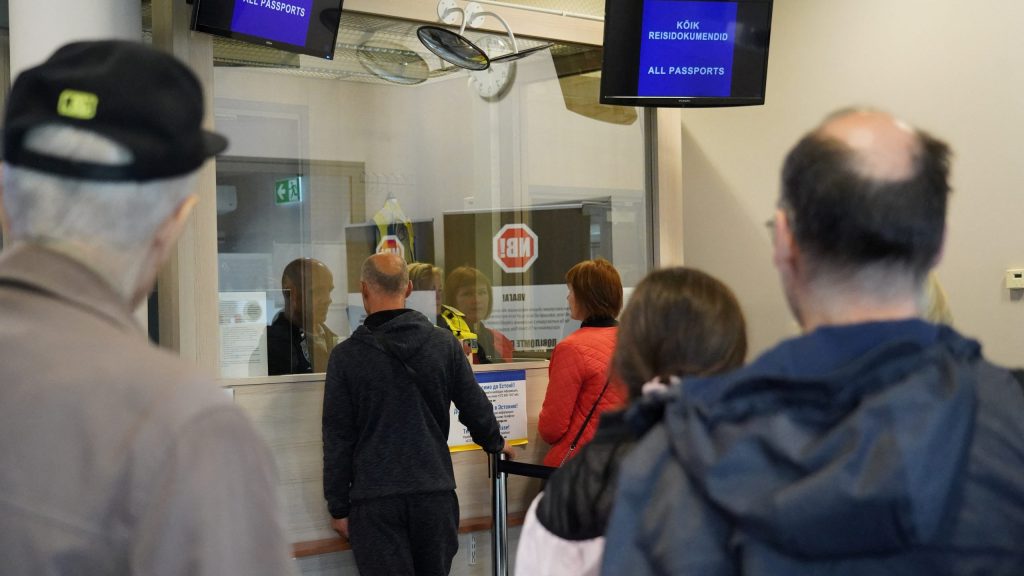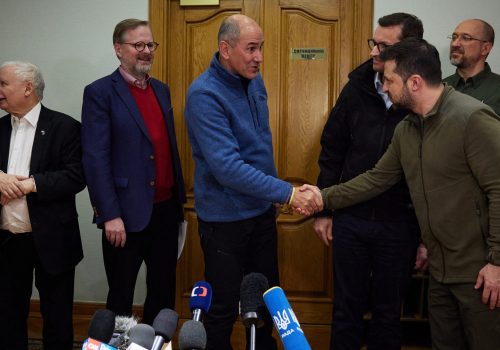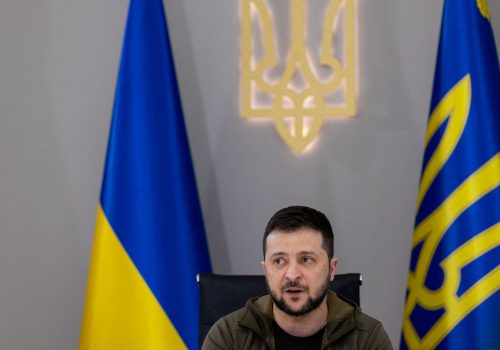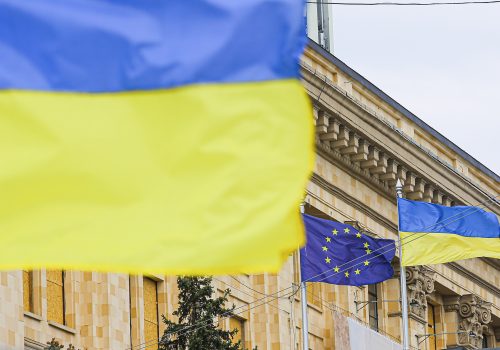In its response to the crisis provoked by Russia, the European Union (EU) has often broken with the past by overcoming its internal differences. Sure, deep divisions remain—and some have become even more visible—but now there is far more political will to reach consensus. This evolution represents a departure from the bloc’s Western-dominated history.
In this new environment, Central and Eastern European countries are taking on moral, political, and security issues nearly two decades after joining the EU. In a sign of maturity and sobriety emerging from a post-communist adolescence, they are assuming responsibility and succeeding in promoting their voice. The way they’ve forced the ongoing review of EU visa policy toward Russia, especially amid Western reluctance, is an excellent illustration of this process.
Six months into the war, Russian citizens were still benefiting from the 2007 Visa Facilitation Agreement, under which they needed to show fewer documents and were charged a lower fee than applicants from countries without a similar deal with the EU (including relatively friendly nations such as Malaysia or Saudi Arabia). Despite Russia’s invasion of Ukraine, most EU countries still complied with the terms of that agreement.
But that will soon change. At the latest EU foreign ministers’ informal meeting in Prague on August 31, member states agreed on the full suspension of the preferential visa agreement. The long-overdue decision will considerably reduce the number of EU visas issued to Russians. Moreover, visa requests by Russians will now be examined far more strictly than before, David Konecký, political director at the Czech foreign ministry, recently told me. The European Commission on September 6 officially proposed the suspension of the EU-Russia agreement, and on September 9 the European Council gave its stamp of approval.
Some countries would like to see the EU go even further by not only ending privileged treatment, but banning tourist visas for Russians altogether. Estonia, Latvia, Lithuania, and Poland (all of which share a land border with Russia) jointly agreed to stop issuing Schengen visas to Russians for tourism, business, sports, and cultural purposes—and on Monday, all four began blocking Russian tourists from entering. This is a big deal, since it means the only land crossing between the EU and Russia that remains open for Russians is Finland (because Helsinki couldn’t find justification under the national legislation for banning Russian tourists). Even so, the country has considerably reduced tourist-visa issuance, accepting applications from Russians only once per week.
On the other side, most of the western part of the EU, including France and Germany, remains reluctant to take such strong steps. Still, according to Konecký, there was a strong consensus at the Prague meeting: Moscow is desperate to see Europe divided—but that’s not happening. Even without a visa ban, there’s a growing understanding among EU countries that relatively unrestricted tourism is no longer a legitimate right for Russians in Europe.
The case for a ban
The Prague meeting was a good example of the EU’s dealmaking capabilities, and the Czech Republic can consider the outcome a significant achievement of its ongoing EU presidency. Countries pushing for a full visa ban should be happy with the moderate approach to which the EU agreed; there are moral, political, and security reasons for the current decision, as well as for further restrictions on Russian travels to Europe. If Moscow continues with its aggression against Ukraine, a full ban may well eventually become a reality.
Morally, European leaders shouldn’t let Russians enjoy the perks of European life when their country is waging a war against an EU candidate and, indeed, against European values in general. German Chancellor Olaf Scholz and several other leaders have expressed fear that a tourist-visa ban would mean applying a principle of collective punishment; but the EU’s current sanctions against Russia, both in response to the Kremlin’s 2014 annexation of Crimea and to this year’s invasion, already adversely affect ordinary Russians.
It’s also worth recalling what German philosopher Karl Jaspers wrote in the aftermath of World War II in a powerful book called The Question of German Guilt (Die Schuldfrage). He distinguished between those who actively participated in the execution of war crimes and those who passively tolerated them: Even the latter were politically guilty, he concluded. Likewise, all adult Russians are not directly responsible for the massacre of civilians in Ukrainian towns such as Bucha—but they bear political responsibility and should pay an appropriate price.
Politically for Europe, unprovoked Russian aggression against its sovereign neighbor is a violation of international law and represents a major threat to the international order. Russians must be made to feel discomfort with the behavior of their government. Visa restrictions help the EU signal to Russians that Moscow crossed a red line. Some of them will understand, but others certainly won’t, and Russian President Vladmir Putin will certainly use this for his anti-EU propaganda. Europe may even lose some support in Russia among those who could feel abandoned, but it shouldn’t blink; it must show strength and commitment to its values.
From a security perspective, it is worth remembering that several Russian subversive operations—such as in Salisbury, England, or Vrbětice, Czech Republic—have involved Kremlin operatives traveling on tourist visas. With Europe’s ongoing efforts to help Ukraine, the continent is even more exposed. Overwhelmed borders in frontline states such as Finland and Estonia make it difficult for local authorities to properly check all Russian tourists. The same applies to visa issuance: After a series of expulsions, EU embassies in Russia are terribly understaffed, and the remaining personnel are unable to properly check all applicants.
Still, when considering a ban on Russian tourism, it’s important to ensure that those who might need to travel to Europe for safety, humanitarian, family, or other reasons can do so. Visa restrictions should go hand-in-hand with programs for those who need to leave the country. Countries calling for the EU tourist ban are often setting an example with such initiatives already in place.
The trouble with existing visas
Ample questions remain: For instance, what should the EU do with the one million Schengen visas already issued to Russians? The problem won’t go away by itself any time soon, as the validity of these visas is generally three years, with some lasting as many as five years. Although most direct flights to Europe from Russia have already been suspended (and nearly all Schengen-area land crossings closed), Finland appears set to keep its border with Russia open.
To understand the scope of the issue, consider this: According to the European Border and Coast Guard Agency (Frontex), almost one million Russians had legally entered the EU through land borders between the beginning of the war and August 22 (with entries to Finland and Estonia making up more than 60 percent). It’s noteworthy, as one EU official pointed out to me on condition of anonymity, that these travelers mostly used visas issued by other European nations rather than by bordering countries.
Ministers in Prague recognized the problem and allowed countries to apply their own national solutions, provided that they are in line with the general rules of the EU’s visa code. This represents a de facto recognition of earlier decisions of the few member states that have limited Russian tourists’ entry on a national-security basis (and also facilitated the recent decision of the Baltic countries and Poland).
A healthy debate
These issues will continue to be debated in the coming weeks and months, but the framing of the conversation marks a departure for the EU: The Prague consensus indicates an instance in which the views of Central and Eastern Europe largely shaped an outcome—despite hesitation among France, Germany, Italy, and Southern Europe. It is yet another indicator of the rebalancing of power within the EU.
Central and Eastern Europe are becoming more influential players, with the Russian war against Ukraine serving as a catalyst of this shift. These countries were ahead of Western Europe in sending heavy weaponry to Ukraine in the early days of the war, and the prime ministers of Poland, Slovenia, and the Czech Republic were the first leaders to travel to embattled Kyiv in mid-March. This trend extends well beyond the region: With Lithuania, Lithuania, and Estonia withdrawing from the “17+1” platform of cooperation with China in recent years and the speaker of the Czech Senate visiting Taiwan in 2020, these countries are also setting a new course toward Beijing.
This is healthy for the EU as a whole, and this process should continue. A more realistic approach toward Russia and China, together with the broader rebalancing of power within the EU, could also help to further strengthen transatlantic cooperation.
To be sure, this process is complicated. Hungary’s democratic backsliding, with its systematic undermining of European consensus, cannot be simply dismissed as an exception; other countries are not immune to the frustrations that are haunting the region. For example, Slovakia for some time seemed like a political and economic success story, culminating with the election of liberal Zuzana Čaputová as president. Yet with the recent departure of one of the coalition parties from the government, the return of populist former prime minister Robert Fico—who has partnered up with xenophobic nationalists—is a worrying possibility. A recent public opinion poll even showed that a majority of Slovaks wanted Russia to win its war in Ukraine.
Central and Eastern Europe’s rise to political prominence won’t be easy, and the results are not guaranteed. But the consensus on visa policy toward Russia is yet another sign that the process has begun.
Petr Tůma is a visiting fellow at the Europe Center and a Czech career diplomat with expertise on Europe, the Middle East, and transatlantic relations.
Further reading
Wed, Mar 30, 2022
Central Europe leads the way in backing Ukraine. Here’s its game plan for what’s next.
New Atlanticist By Petr Tůma
The European Union’s eastern members have an opportunity to prove their political and diplomatic mettle—and they're seizing it.
Wed, Apr 6, 2022
Zelenskyy wants Ukraine to be ‘a big Israel.’ Here’s a road map.
New Atlanticist By Daniel B. Shapiro
By adapting their mindset to mirror aspects of Israel’s approach to security challenges, Ukrainian officials can tackle their own critical challenges with confidence.
Thu, May 26, 2022
The buzz in Europe’s halls of power about Ukraine’s EU bid
Experts react By
Our Europe experts break down what to expect from the European Council's special meeting on issues related to the war in Ukraine.
Image: People wait at the border crossing point with Russia in Narva, Estonia, on September 18, 2022. Photo by Janis Laizans/REUTERS



